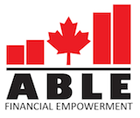Canadian financial empowerment leaders share what financial empowerment means to them and the important work their organizations are doing to improve the financial well-being of Canadians living on low incomes.
About ABLE
ABLE is a cross-sector community of practice working to reduce poverty through financial empowerment. It is a coalition of practitioners, financial institutions, researchers, academics, policymakers, and funders dedicated to reducing poverty in Canada through financial empowerment initiatives.
Goals
In 2015, the ABLE Financial Empowerment Steering Committee adopted the following 2020 goals:
- Expand financial information, education, coaching, and problem solving to reach 1 million Canadians with low incomes.
- Leverage an additional $100 million in income for eligible Canadians living in poverty by facilitating their access to tax filing and government benefits.
- All financial institutions adopt strategies and implement substantive changes to better meet financial literacy, banking, and advice needs of customers/members living on low incomes.
- Increase take-up of the Canada Learning Bond to 40% of eligible beneficiaries.
- Increase the number of Registered Disability Savings Plans opened by 100,000.
- All provinces enact fringe financial service regulation that effectively protects consumers.
- Municipal, provincial and federal government departments integrate financial empowerment approaches into relevant policy, program and funding frameworks where these can help to improve target outcomes.
Financial Vulnerability
Financial vulnerability (having low, no or negative net worth) has reached record levels in Canada:
- One in six Canadian households have zero or negative net worth
- Almost one in four households have no financial assets at all
- Canadian household debt is the highest in the G7 at 164% of annual income
- Household savings are at an historic low of 3.3% of annual income.
Financial vulnerability affects Canadians at all income levels, but those living in poverty most of all, as many have no savings to fall back on in emergencies and no ability to cut back on expenditures to meet their basic needs. Many are also burdened by debts that make it increasingly difficult to cope.
Financial Empowerment
Financial empowerment is an approach to poverty reduction that focuses on improving the financial security of people living on low incomes. It is a set of interventions that together help low-income Canadians to grow their incomes, improve their credit scores, savings and debt levels, and build wealth through education, employment, entrepreneurship and improved housing.
Financial empowerment isn’t like most other poverty reduction approaches. It focuses on helping low-income people participate and feel included in our financial system. It increases their opportunities and knowledge, and fosters behaviours that are critical to their economic security and their ability to invest in their future.
The financial empowerment approach includes five main types of interventions described in the following framework:

Objectives
The ABLE Steering Committee has set the following objectives to guide the work of its members and the broader community of practice:
- Foster research on financial empowerment needs and effective responses.
- Mobilize emerging knowledge to inform and encourage development, implementation and scaling of effective financial empowerment programs, products, services, frameworks, tools, and resources.
- Actively encourage federal and provincial/territorial governments to integrate financial empowerment into relevant strategies, policies, and plans.
- Develop and actively promote public policies and regulation that will help Canadians with low incomes to build their financial wellbeing.
- Animate Support and sustain a national Financial Empowerment Community of Practice to support financial empowerment efforts in all sectors.
- Collaborate with stakeholders and other groups to secure funds for ABLE led projects, events, and initiatives, including a biennial conference.
- Raise awareness and promote messaging about financial empowerment to all Canadians, with a focus on serving individuals living on a low income.
Members
At the 2013 ABLE conference, participants expressed strong support for the idea of formalizing financial empowerment work in Canada by establishing a Steering Committee. This committee coordinates and encourages the exchange of knowledge and expertise across the community of practice, fosters research on financial empowerment needs, and promotes public policies that will help Canadians with low incomes to build their financial well-being. The ABLE Steering Committee was formed in 2014 and has been meeting quarterly.
The ABLE Steering Committee includes representatives from the following organizations:
- ABC Life Literacy Canada
- AFOA Canada
- Assiniboine Credit Union
- EBO Financial Education Centre
- Economic and Social Inclusion Corporation (ESIC)
- Momentum
- Prosper Canada
- SEED Winnipeg Inc.
- SmartSAVER
- Stella’s Circle
- United Way of the Alberta Capital Region
- Vancity (Vancouver City Savings Credit Union)
- West Neighbourhood House (formerly St. Christopher House)

New study shows low-income Canadians fighting for financial survival
The financial resilience and financial well-being of Canadians with low incomes: Insights and analysis to support the financial empowerment sector detailed report, paints a stark picture of the disproportionate financial impact of the pandemic on low-income households and their challenges finding the financial help they need. Commissioned by Prosper Canada and the ABLE Financial Empowerment Network, and conducted by Seymour Management Consulting.


